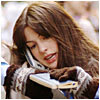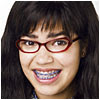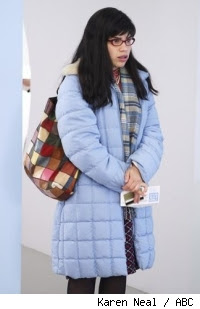Hour Magazine - "Our Miss Brooks" Cast Reunion - 1985!
Our Miss Brooks : TV series 1952-1956
Director: William Asher
Writer: Bob Weiskopf (writer)
Genre:Comedy / Family
Plot summary: Miss Brooks teaches English at Madison High, rents a room from Mrs. Davis, gets rides to school with student Walter, fights with Principal Conklin, and tries to snag shy biology teacher Boynton. In the last year she switches to Mrs. Nestor's private school.
Awards:Won Primetime Emmy. Another 6 nominations :
1956 
Nominated
Emmy
Best Actress - Continuing Performance Eve Arden
1955
Nominated
Emmy
Best Actress Starring in a Regular Series Eve Arden
Best Situation Comedy Series
Best Supporting Actor in a Regular Series Gale Gordon
1954
Won
Emmy
Best Female Star of Regular Series Eve Arden
Nominated
Emmy
Best Situation Comedy
1953
Nominated
Emmy
Best Situation Comedy
http://www.imdb.com/title/tt0044287/
OUR MISS BROOKS
U.S. Situation Comedy
The successful 1950s sitcom Our Miss Brooks was, heart and soul, actor Eve Arden. A Hollywood film and New York stage veteran, Arden specialized in playing the wisecracking friend to the heroine. She often did it better than anyone else, achieving her greatest success with an Oscar nomination for 1945's Mildred Pierce. But Arden's skill with the wicked one-liner and acid aside was beginning to lead to typecasting. To find a new image, Arden signed on for the radio comedy role of Connie Brooks, English teacher at fictional Madison High School, a smart and sharp-witted--but ever-likable--character. And unlike most of her film roles, radio offered her the lead.
Beginning on radio in 1948, Our Miss Brooks was successfully transferred to television beginning in 1952 (it ran on both media, with largely the same cast, for several months in 1952). Between gentle wisecracks, Miss Brooks doted on nerdish student Walter Denton, and frequently locked horns with crusty, cranky principal Mr. Conklin. Many of the program's episodes, however, revolved around Miss Brook's unrequited desire for Philip Boynton, the school's biology teacher. In this way Miss Brooks was the beginning of a long list of TV spinsters, to be followed by Sally Rogers (Rose Marie) on The Dick Van Dyke Show and Jane Hathaway (Nancy Kulp) on The Beverly Hillbillies.
The program had enjoyed good ratings on radio and only enlarged its audience when it moved to TV. And while some professional educators criticized the series, others celebrated Miss Brooks and Arden's work: she got teaching job offers, fan letters from educators, was made an honorary member of the National Education Association and, in 1952, was given an award from the Alumni Association of the Teachers College of Connecticut for "humanizing the American Teacher." Said Arden of her on-screen alter ego: "I tried to play Miss Brooks as a loving person who cared about the kids and kept trying to keep them out of trouble, but kept getting herself in trouble."
Obviously, Miss Brooks encountered enough trouble to sustain the series for over 150 episodes, but, unlike many other female comics on TV at that time, Miss Brooks' forte was not the wild antics that were the norm of Lucy or the lopsided logic that was the domain of Gracie Allen. Instead, Miss Brooks humor was achieved by her own sharp, observing wit and by her centered presence in the midst of a group of eccentric supporting players--dimwitted, squeaky-voiced student Walter, pompous Conklin, and the others. Miss Brooks was always the source of the jokes, not the butt of them.
In 1955, ratings were beginning to wane, and the series was overhauled. Miss Brooks and Mr. Conklin were moved out of Madison High to Mrs. Nestor's Private Elementary School. For a time there was no Mr. Boynton for whom Miss Brooks would pine, but there was a muscle-bound PE teacher, Mr. Talbot, who longed for Miss Brooks. This was an important turnabout in the overall premise of the show: now Miss Brooks was the pursued rather than the pursuer. (Mr. Boynton did turn up again in early 1956 just in time for the series to be canceled; in a film version of the series released by Warner Brothers in 1956, Miss Brooks and Mr. Boynton finally did tie the knot and presumably lived happily ever after.)
Connie Brooks was one of TV's noblest working women: the center of a highly successful show, toiling in a realistically portrayed, and unglamorized career (Miss Brooks often made mention of how low her wages were), and rewarded and honored by real workers whom she represented. While she was not quite as "no nonsense"--nor so tough--as film's prominent working women (Rosiland Russell, Joan Crawford), Connie Brooks, with her tart tongue, brisk manner, her sharply cut jackets and slim skirts, was just about as savvy as women were allowed to be on TV in the 1950s. And despite Miss Brooks desire to become "Mrs." Something--and despite the fact that she was never promoted to school principal--Our Miss Brooks legacy in TV history is that it dared to depict a woman, funny, attractive, wise, competent and working--outside the home, marriage, and children.
http://www.museum.tv/archives/etv/O/htmlO/ourmissbroo/ourmissbroo.htm
Radio Shows:
Project X (1955-03-06): Miss Brooks is saved from falling down an open esculator by Jason Brill (rival of principle). To get promoted the principle has started project X - where he has formed a device which allows him to lishen in on students and teachers in the school anywhere. Various characters also stage accidents in order to allow the principle to become a hero and get promted.
Writing Magazines Articles- With Aliases (1955-04-17) : Miss Brooks along with the principle pretend to be someone else and write articles in order to recieve money from a magazine. Both use Walton and pretend he is their son.
http://www.freeotrshows.com/otr/o/Our_Miss_Brooks.html (has all the radio shows)
There are major similarities and differences between Ugly Betty and Our Miss Brooks:
- Similar : Protagonist of both have low paid/low status jobs- miss brooks is a english teacher which is typcially a female subject and an assistant role is usually viewed as a female role.
- Similar: the principle is a male and so is the boss of Betty , so both reflect and reinforce patriarchy
- Differences: genre -ugly betty is a hybrid of comedy and drama etc, although it is a sitcom , it has elements of other genres whereas Our Miss Brooks is clearly a sitcom and nothing more. Ugly Betty is trying to be different due to all the competition, as Our Miss Brooks was the first office sitcoms so it did not have to compete for audiences.
- Differences: the narrative is more complex in Ugly Betty as well as dealing with day to day problems, some continue to the next episode whereas Our Miss Brooks just deals with the problems within each episode.
- The change in genre and narrative reflects the change in society and shows firstly how complex society has become. Society has modernized and we are in the post- modern period where there is choice and varied options. Moreover, the complex narratives etc reflect a more active audience whereas before the audience was more passive.
- Difference: Betty is shown to be Mexican whereas the characters in Our Miss Brooks are white, which reflects how society has changed, become more muticultural and diverse.
- Difference: Miss Brooks is shown to be pretty whereas Betty is not- again the idea of being different and reflecting issues concerning image etc.
- Similar: Although Miss Brooks was the first independent female, the fact that shes at teacher does not take her away from gender roles, as she teachs children and although she is single, she fulfuils her nurturing mother role, this is the same with Betty as she has a motherly role as she looks out for Daniel.
Useful Books:
Hamamoto, Darrell Y. : Nervous Laughter: Television Situation Comedy and Liberal Demoncratic Ideology, 1980, Praeger publishers, New York
Moore,Barbara , Bensman, Marvin R. ,Dyker,Jim Van: Prime-Time Television: A Concise History, 2006, praeger publishers







